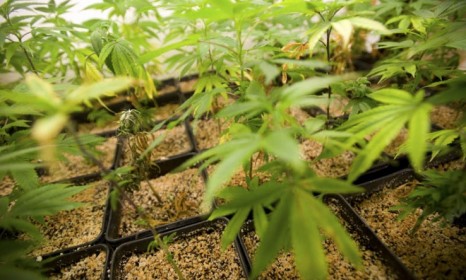Oregon's tiny, 'idyllic' hotbed of marijuana
What happens to a town when pot growing is the bedrock of the local economy?

A free daily email with the biggest news stories of the day – and the best features from TheWeek.com
You are now subscribed
Your newsletter sign-up was successful
As politicians and legislators wrangle over the legal status of marijuana — for medical as well as recreational uses — the rural hamlet of Williams, Ore., has taken matters into its own hands. The "idyllic" Williams, with a population of about 2,000 people, has emerged as the crown jewel in the "Emerald Triangle," a verdant region along the Oregon-California border with a rich heritage of pot cultivation. More than 400 people, or roughly 20 percent of the small town, are each registered with the state of Oregon to legally grow up to six marijuana plants for medicinal purposes. In one local zip code with 80 residents, 60 people have pot-growing permits. Here, a brief guide:
How did all this pot growing start?
The area around Williams has an ideal climate for growing marijuana. When hippies from California and elsewhere traveled here in the 1970s, they found a remote agricultural area with a "live-and-let-live" attitude, making it perfect for pot cultivation. After Oregon's medical marijuana law was implemented in 1999, many illegal pot growers "came out of the woods and started doing it legally," said Keith Mansur, editor of the Oregon Cannabis Connection, as quoted by the Associated Press.
The Week
Escape your echo chamber. Get the facts behind the news, plus analysis from multiple perspectives.

Sign up for The Week's Free Newsletters
From our morning news briefing to a weekly Good News Newsletter, get the best of The Week delivered directly to your inbox.
From our morning news briefing to a weekly Good News Newsletter, get the best of The Week delivered directly to your inbox.
What's the economic impact?
Profound, according to the locals. Like many parts of the Northwest, Williams and the surrounding communities have been pummeled by the downturn in logging, farming, and other economic mainstays. The recent surge in marijuana cultivation has stimulated the local economy through sales of growing equipment like fencing, fertilizers, and potting soil. But because a lot of the cash-based commerce takes place off the books, it isn't taxed, and thus doesn't help local schools, libraries, or other struggling public services.
Are the police cracking down?
Yes, to a degree. There are limits to what people can get away with, even in laid-back Williams. A local couple was busted in 2009 for having 220 pounds of pot, far more than the 16.5 pounds allowed by Oregon law. Since it was a first offense, the couple served just a month in jail after pleading no contest. The total amount of illegal selling and growing in the area is difficult to determine.
A free daily email with the biggest news stories of the day – and the best features from TheWeek.com
Is everyone in the town happy about this?
No, especially at harvest time in the fall, when growers take aggresive action to thwart pot thieves. "Some people dress up like Vietnam and walk around with guns," says local grower and activist Laird Funk. "But you could kill people like that, so I don't." Still, people see value in an agricultural crop that can replace a once-vibrant timber economy. "Forget cutting the trees," says area resident John Rickert. "Let's legalize marijuana."
Sources: Associated Press, Spokesman Review
-
 Labor secretary’s husband barred amid assault probe
Labor secretary’s husband barred amid assault probeSpeed Read Shawn DeRemer, the husband of Labor Secretary Lori Chavez-DeRemer, has been accused of sexual assault
-
 Trump touts pledges at 1st Board of Peace meeting
Trump touts pledges at 1st Board of Peace meetingSpeed Read At the inaugural meeting, the president announced nine countries have agreed to pledge a combined $7 billion for a Gaza relief package
-
 Britain’s ex-Prince Andrew arrested over Epstein ties
Britain’s ex-Prince Andrew arrested over Epstein tiesSpeed Read The younger brother of King Charles III has not yet been charged